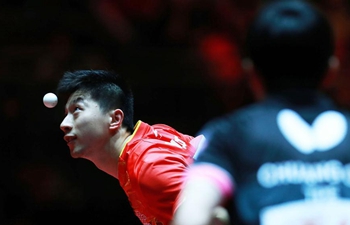SAN FRANCISCO, June 3 (Xinhua) -- A study on young female mice reveals how puberty hormones might trigger changes in neural communication in the frontal cortices and impede some aspects of flexible youthful learning.
"We have found that the onset of puberty hits something like a 'switch' in the brain's frontal cortex that can reduce flexibility in some forms of learning," said Linda Wilbrecht, an associate professor of psychology and neuroscience at the University of California, Berkeley, and the senior author of the study published this week in the journal Current Biology.
The changes occurred in a region of the frontal brain that is associated with learning, attention and behavioral regulation.
Overall, children have been found to have greater brain flexibility or "plasticity" than adults, enabling them to more easily master multiple languages and other elementary scholastic pursuits.
While they continue to learn after puberty, their cognitive focus in adolescence is often redirected to peer relationships and more social learning.
If hormonal changes start as early as second or third grade, when children are tasked with learning basic skills, a shift in brain function could be problematic, noted Wilbrecht.
"Puberty onset is occurring earlier and earlier in girls in modern urban settings, driven by such factors as stress and the obesity epidemic, and has been associated with worse outcomes in terms of school and mental health."
For the study, Wilbrecht and her laboratory team at UC Berkeley and the University of California, San Francisco, induced puberty in some young female mice by injecting them with pubertal hormones such as estradiol and progesterone, and blocked puberty in others by removing their ovaries.
In measuring the electrical activity of brain cells in the frontal cortices of post-pubertal mice, they observed significant changes in the synaptic activity thought to regulate brain plasticity.
They also compared the higher-order learning strategies of pre-pubertal and post-pubertal mice by testing their ability to find Cheerios cereal hidden in bowls of wooden shavings scented with licorice, clove, thyme or lemon.
After each mouse figured out which scent was paired with the Cheerios, that pairing was changed so the mice had to use trial and error to adapt to the change and learn the new rule.
Overall, the researchers found that the post-pubertal mice had a harder time adapting to the rule changes than their pre-pubertal counterparts.
"These data demonstrate that puberty itself, not just age, plays a role in frontal cortex maturation," concluded the authors, who also noted that future studies on males will be needed to determine if the present results apply to the male brain.
"To our knowledge, this study is the first to demonstrate changes in cortical neurotransmission due to hormones at puberty," study lead author David Piekarski, a post-doctoral researcher in Wilbrecht's lab, was quoted as saying in a news release from UC Berkeley.

















